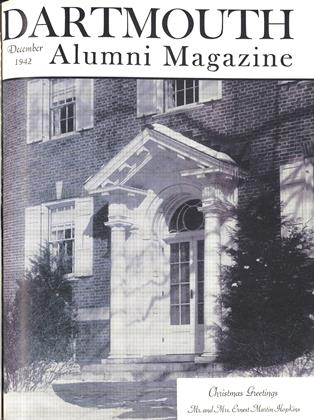Ben Ames Williams '10.Houghton Mifflin Company.1942. 750 pages.$2.75.
THE FOURTH NOVEL in a series dealing "with our American wars, not on the battle front, but in the minds of civilians at home," Time of Peace covers the twelve years that ended on December 7, 1942. The plot is domestic. In 1930, the death of Mark Worth's wife leaves him, "almost forty," to concentrate his affections on his eleven-year-old son Tony. Though a Bostonian, Mark is partly Southern and partly Mid-Western in his origins: he has a judicial tendency to see all sides of a matter. Very slowly, while the Axis threat to American security becomes more and more apparent, Mark and his son and their friends alter their varying minds toward something like a unanimous resolve. The jacket declares that "the book is essentially the story of the relationship between a father and his adolescent son"; but other relationships and many characters give depth and breadth to the picture of a perplexed nation.
There is local color. Tony spends four of the troubled years at Dartmouth, where he studies a little, ski-s, falls in love, and worries about war. It does not appear that Tony owes very much of his education to the Dartmouth faculty, though all references to the institution are loyal and kind,—except, perhaps, the old, vague charge that professors abruptly reversed their teachings from pacifism to belligerence, and this accusation is now a national myth.
Mr. Williams' novel is a very human book and will be read with pleasure because of its warm sympathies and agreeable characteriza- tions. The author should not be blamed, but praised, if some readers find the book saddening because it indicts a whole nation on the count of colossal stupidity.
 View Full Issue
View Full Issue
More From This Issue
-
 Article
ArticleHanover's First Aid Maestro
December 1942 By JOHN HURD '21 -
 Article
ArticleDartmouth War Directory
December 1942 -
 Article
ArticleThe Five Maries
December 1942 By WILLIAM CARROLL HILL -
 Class Notes
Class Notes1918*
December 1942 By ERNEST H. EARLEY, DONALD L. BARR -
 Class Notes
Class Notes1935*
December 1942 By JOHN D. GILCHRIST JR., BOBB CHANEY -
 Sports
SportsBig Green Teams
December 1942 By Elmer Stevens JR. '43
Books
-
 Books
BooksTUCK SCHOOL PUBLISHES "MANUAL ON RESEARCH AND REPORTS"
MARCH 1931 -
 Books
BooksSpinning Spheres a Story of Copernicus
April1935 -
 Books
BooksFaculty Articles
March 1956 -
 Books
BooksTHE HUNGRY YEARS: THE STORY OF THE GREAT AMERICAN DEPRESSION.
MARCH 1968 By CLIFF JORDAN '45 -
 Books
BooksTHE STRANGE WOMAN
November 1941 By H. M. Dargan -
 Books
BooksOf Special Note
MAY 1971 By J.H.


